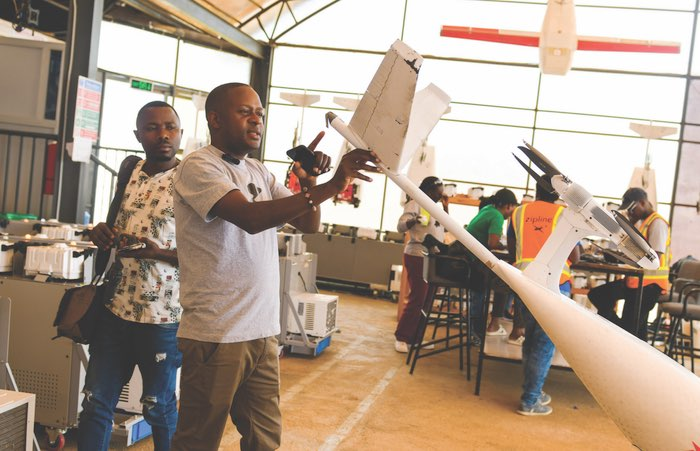
Prosper Uruvugundi, Partnership Manager at Zipline (Photo by Chanel Retief)
Drone delivery and logistics company Zipline continues to make inroads for communities in the remote areas of Rwanda to access essential medical and agriculture supplies.
Over an hour’s drive outside the city of Kigali, if you happen to see a drone flying overhead, you must know that it has been launched from the Zipline facility in Muhanga, and is probably on its way to deliver a package to a remote village in Rwamagana in the Eastern Province of Rwanda.
Who will be receiving this package, you may ask? A farmer. And what is being delivered? Pig semen.
“To help increase the genetic diversity of pigs, farmers purchase pig semen and engage a veterinarian trained in artificial insemination,” states an article by the U.S. Agency for International Development (USAID) on quality livestock and breeding in Rwanda.
Zipline, a drone delivery and logistics company, has sought to simplify the pain and process of access, eliminating the need for farmers to drive long hours to buy pig semen and bring it back to their farms, oftentimes in an already compromised state.
“Healthy animals and insemination products delivered right on time means more nutritious animal proteins and products,” Prosper Uruvugundi, Partnerships Manager at Zipline, tells FORBES AFRICA, as he takes us past the refrigerators storing semen in the warehouse at Muhanga.
The storeroom features rows of shelves for medication and medical supplies, and cold rooms that store blood for both human and animal needs.
The process, while seemingly seamless, involves many important requisites, for example, the standard hospital or medical services’ delivery requests.
Uruvugundi says that once the order comes through via phone, SMS, WhatsApp, API, or on the Zipline app, the technician will start to process the order.
“This order is coming from Kayonza (from a smallholder farmer in the Eastern Province),” he says, pointing at a screen. “He has requested pig semen.”
Following a query for clarification, “Yes,” says Uruvugundi matter-of-factly.
“Chances are the farmer either has veterinarian training or one on site who will do the insemination.”
Another technician has already taken out a unit of the product and started the process of wrapping it up carefully. Zipline delivers many more products for farmers.
In 2022, Zipline partnered with the Government of Rwanda, which included the Rwanda Agriculture and Animal Resources Development Board (RAB), to up the delivery of both healthcare and animal care goods in the country.
That year alone, the Ministry of Agriculture reportedly delivered more than 500,000 doses of animal health vaccines and more than 8,000 units of swine semen to vets and farmers, using Zipline.
With access to animal husbandry products and an increased fertility rate, more pigs can be raised with a healthier genetic profile.
The company’s autonomous drones operate on optimized flight paths, which are calculated, based on real-time data to ensure swift and reliable deliveries.
Their operations are controlled by a central system that continuously monitors weather, traffic, and the healthcare and farming facility’s demand to coordinate multiple deliveries.
According to Pierre Kayitana, Zipline’s General Manager, this data-driven approach helps reduce response times, increase delivery precision, and ensure that supplies reach their destinations without delay.
“We’re also mindful of the local communities and ecosystems, using technology that minimizes noise and environmental disruption while maximizing the efficiency of each flight,” Kayitana tells FORBES AFRICA.
What started as an operation designed to deliver blood supplies and medicine to remote areas throughout Rwanda has now shaped itself into one that is using technology to tackle an entire ecosystem. “We’re actively scaling up to provide 100% coverage for all Rwandan health posts,” Kayitana says.
“[This ensures] that every community, no matter how remote, has access to essential medical supplies. Our focus in Rwanda will continue to grow, with plans to expand our range of delivered products, potentially incorporating new health solutions like malaria treatments.” As Uruvugundi takes the packaged semen from the ‘Ready to Fly’ post, places the box into the drone and locks it in, we ask how long it would take for the package to reach the farmer. The flight engineer starts the process, calling in the launch to the control room, signaling it to begin. As the drone zooms past Uruvugundi, he smiles and says with surety: “It will not be more than an hour, maybe two.” [Source : Forbes Africa] (End)
